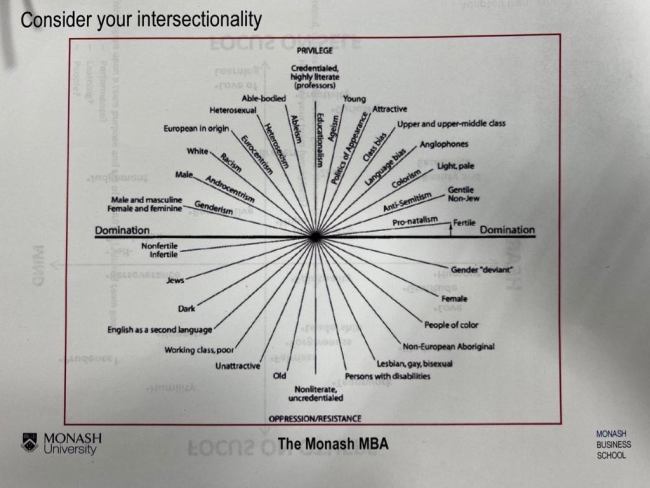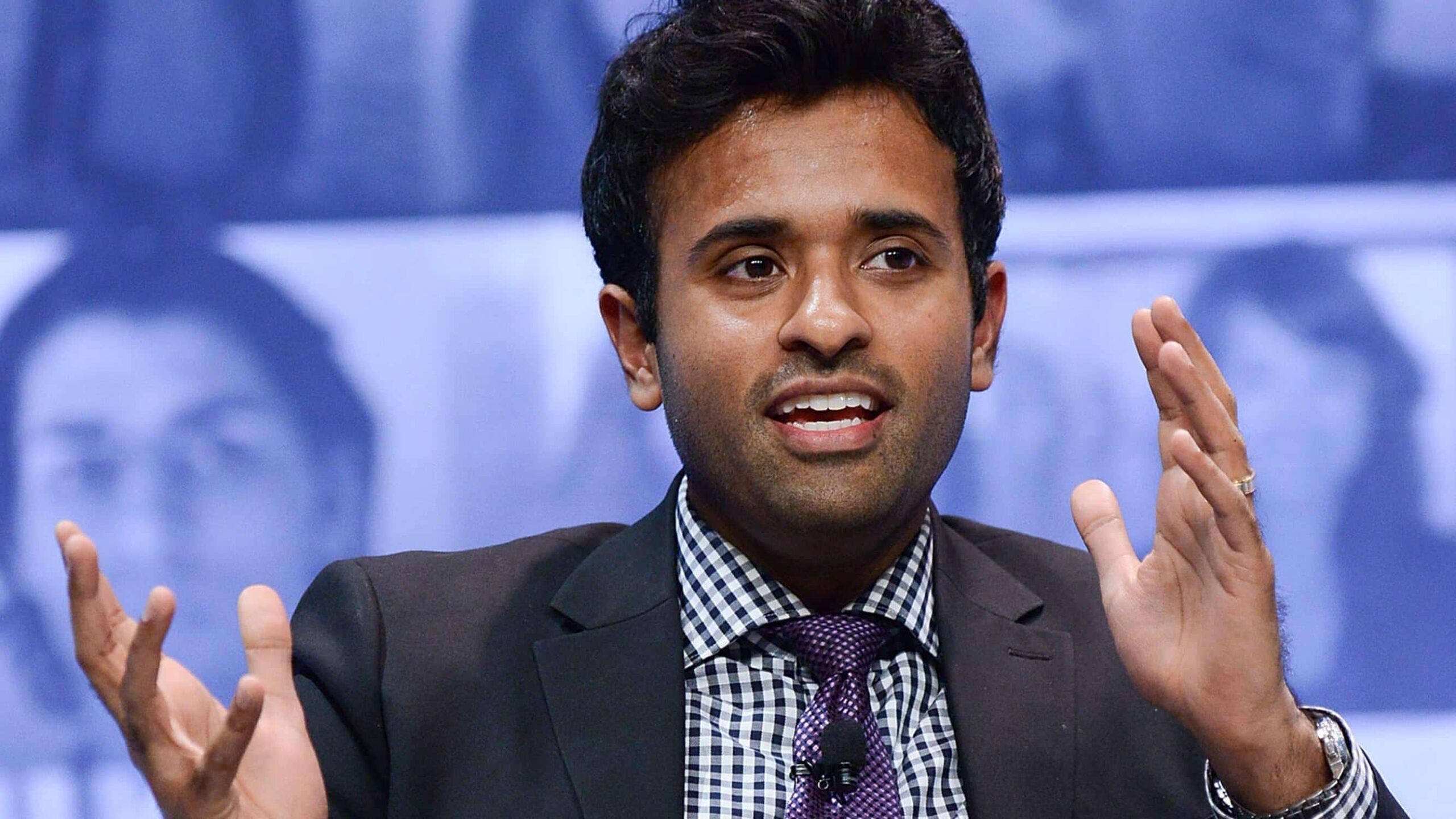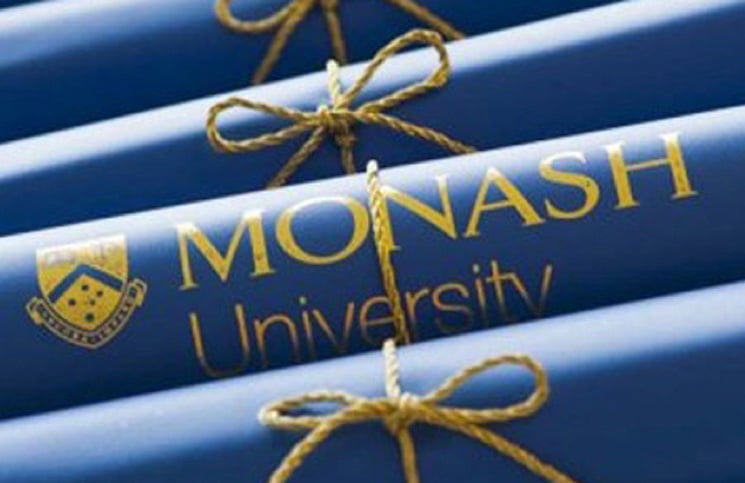The fraught path for Australian business schools taking the leap into radical identity politics was on show this week with Monash University Business School being lambasted by its own students for a “disgusting” exercise that forced students to evaluate their own “privilege”.
Sky News reported that MBA students at Monash University’s Caulfield campus were asked to “consider your intersectionality” with the aid of a highly-detailed graph emphasising human traits which were identified as a “privilege” or “oppression”.
Students who were male, white, attractive, upper or middle class and highly literate, among other characterisations, were considered to have “domination” over those who were “gender deviant”, “non-fertile”, female, working class, disabled or a person of colour.

A Monah MBA student, who asked not to be named to avoid repercussions from the university, told Sky the entire exercise was “absolutely disgusting” while another student claimed the inclusion of the radical gender and race theory “deliberately divides” the cohort to suit the university’s ideology.
“I would say instead of empowering students to focus on individual responsibility they are saying that one’s potential and success is limited by immutable characteristics,” the student told SkyNews.com.au. “It ignores everyone’s individual circumstances and deliberately divides people in a way that aligns with their ideology.”
Intersectionality is the controversial study of how different social, physical and political traits combine to dictate whether a person is advantaged or disadvantaged in society.
While radical academic ideas like intersectionality, critical race theory and modern monetary theory are accepted as articles of faith in most university humanities faculties, they are yet to make their way onto the curriculum of most business schools.
That is not to say business schools have become the university sector’s last bastion of free-thinking libertarianism.
Many schools have embraced and integrated elements of social justice and ESG frameworks throughout their MBA programs to great success. These teachings reflect the changing nature of organisations, and their leaders, to be more than profit machines that exist only to benefit shareholders.
But how woke, is too woke? It is a question business schools, and their customers (students), will need to ask more frequently as activist progressivism continues its march across campuses.
The role of politics in management education has emerged as a hot button issue in the United States, with the New York Times going so far as to ask: “Have the Anticapitalists Reached Harvard Business School?”
Journalist Emma Goldberg said today’s business school students were learning about corporate social obligations and how to “rethink capitalism” alongside traditional management theory.
“Top-ranked business schools are stepping into the political arena. Harvard started its Institute for the Study of Business in Global Society last month,” she wrote.
“Nearly half of the Yale School of Management’s core curriculum is devoted to ESG. Next fall, the Wharton School of the University of Pennsylvania will start offering MBA majors in diversity, equity and inclusion (DEI) and in environmental, social and governance (ESG) factors for business.”
The new Wharton majors sparked “fear” in the US with one (anonymous) graduate warning against a one-sided presentation of left-wing politics used “to justify increasing the power of the state in markets and firms while demonizing capitalism.”
Vivek Ramaswamy, entrepreneur, author of Woke, Inc. and Republican Presidential candidate in the United States is one person willing to push back against the politicisation of business schools, and brave enough to put his name to it.
In Woke, Inc. he highlights what he calls Wokenomics, in which American corporations hide their corruption and greed behind the disingenuous virtue signalling of liberal values, particularly ESG investing.
Ramaswamy believes the inclusion of the ESG/DEI major at Wharton goes hand-in-glove with affirmative action that “lowers the overall quality of students that Wharton admits, which necessitates intellectually lightweight ‘majors’ like ESG and DEI.”

UTS Business School Dean Carl Rhodes has written extensively about the intersection of progressive politics and management education and believes the idea that business schools are havens of woke activism is “idiotic“.
In an article for Times High Education (THE) Professor Rhodes argues business schools’ increasing embrace of stakeholder theory was unlikely to have any “revolutionary” impact on “rethinking capitalism”.
“Decades of globalisation, financialisation, tax cuts at the top, corporate expansion and shareholder primacy have resulted in an economic system that has benefited the few over the many,” he wrote in an article earlier this year.
“Stakeholder capitalism does not herald a change to the underlying structure of that system.”
“Rethinking and changing capitalism for a more equal future requires comprehensive and radical political and economic policy reform on national and global levels, and across divides of gender, race and class. No individual business or business school is in a position to drive such a vast agenda.
“At best, a revitalised business education can help make tomorrow’s business leaders be less destructive and exploitative than their predecessors, such that they might have some role in addressing this crisis of inequality. At worst, however, the promotion of stakeholder capitalism as some sort of panacea will distract from the much bigger political project of radically rethinking capitalism for distributive justice and shared prosperity.”
Ultimately, students will vote with their feet whether they want to learn skills to be better organisational leaders with a rounded worldview or be part of a political project to radically rethink capitalism.







